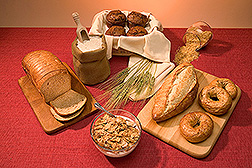This page has been archived and is being provided for reference purposes only. The page is no longer being updated, and therefore, links on the page may be invalid.
For a Healthier Heart, Don't Go Against the Grain
By Rosalie Marion BlissJuly 27, 2005
Women with a history of heart disease who participated in a research study and reported having eaten six or more servings of whole grains per week had slower progression of atherosclerosis, a condition in which built-up plaque narrows the passageways through which blood flows. Researchers funded by the Agricultural Research Service (ARS) and other granting agencies reported the findings in the July issue of the American Heart Journal.
The study was led by Alice H. Lichtenstein, director of the Cardiovascular Nutrition Laboratory at the Jean Mayer USDA Human Nutrition Research Center on Aging at Tufts University in Boston, Mass. She and colleagues studied 229 postmenopausal women who had participated in the Estrogen Replacement and Atherosclerosis Study.
Plaque forms when fatty substances in blood plasma build up in artery walls.
The researchers studied dietary intake data taken from questionnaires and performed angiograms to assess changes in the volunteers' coronary artery diameter over a 3-year period. The frequency of dietary intake of fats, cholesterol, essential nutrients and alcohol was also taken into account.
The researchers found that the progression of stenosis--narrowing of the diameter of arterial passageways--was less in women who reported higher intakes of cereal fiber from whole-grain foods than those reporting lower intakes.
The data suggest that following current dietary recommendations can slow the rate of heart disease progression. The 2005 Dietary Guidelines for Americans urges people to consume at least three servings of whole-grain foods per day. But experts say currently most Americans consume less than a single serving of whole grains daily.
Whole grains can be found in breakfast cereal made with whole grains, oatmeal, brown rice, barley, popcorn, whole-wheat bread and cereal, bran muffins, whole-wheat bagels and whole-wheat flour.
ARS is the U.S. Department of Agriculture's chief scientific research agency.

